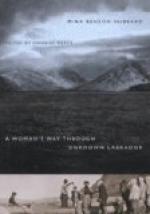“Why?”
“You will get dizzy and fall in.”
“But I do not get dizzy.”
“Maybe you think you will not. It is all right when you are looking at the rapid, but it is when you turn that you will fall. It is very dangerous. If you are going to do that we will just turn round and go back to Northwest River.”
That settled the matter.
The river here became impracticable, and Job went forward to hunt out the trail. The sandhills at this point stood back a little from the river. The low-lying land between was thickly wooded, but up on the hills the walking was good. So the trail was cut straight up the bank which was eighty feet high and very steep.
If any one supposes that cutting a trail means making a nice, smooth little path through the woods, let him revise his ideas. The hill-side was a network of new growth and windfalls. Now and again I made the mistake of calling them deadfalls. Certainly all women, and perhaps a few men, would think the mistake pardonable could they see the trail which led straight over the tangled heaps of fallen tree-trunks. I watched the men carrying the canoes and their heavy loads over these with wonder almost equal to that with which I had looked at Job’s work in the rapids.
The outfit made about four loads each for them, and when it was all safe on top of the hill, Joe sat down trembling like a leaf. George looked a bit shaky, and Gilbert very hot and tired.
Joe said: “In a week George and I will be hardened up so that there won’t be any trembling.”
Job said: “Always hard.”
By noon it had grown very hot. There was scarcely a stir in the air, and the sun beat down on the sand-hills in no gentle manner. The perspiration ran down the men’s faces as they carried, and the flies were beginning to come. After lunch Job set up two impromptu wigwams, stringing a tarpaulin over each, and under these shelters the men rested till 4 P.M. By camping time the outfit had been moved up over the portage about a mile, and I had learned something more about what packing means.
All day it had been slow, hot work, and the men were tired. I thought I would take a hand in making camp and getting supper. We had a beautiful camping-place, its only drawback being the distance from the water supply, for we were now 200 feet above the river, and some distance back from it. The ground was dry and moss covered, and the scattered spruce supplied the carpets for the tents which were soon ready for the night.
There were bannocks to be made again, and I helped to cook them. It was no small surprise to find how much art there is in doing it. At first I thought I could teach the men a lot of things about cooking bannocks, but it was not long before I began to suspect that I had something to learn. They were made simply with the flour, salt, baking-powder and water, but without any shortening. This made them tough, but they carried better so. As George said: “You can throw them round, or sit on them, or jump on them, and they are just as good after you have done it as before.”




